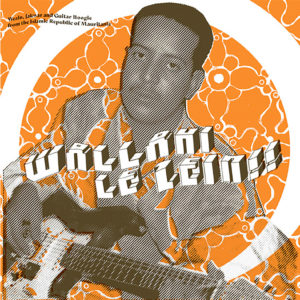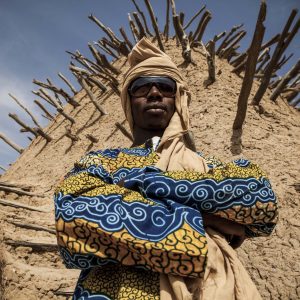Imarhan’s ‘Aboogi’ finally brings Tuareg blues home
The Algerian band’s latest album was recorded in Tamanrasset, a city of great significance for the Tuaregs that finally boasts its own professional recording studio.
Author:
29 March 2022

Algerian Tuareg band Imarhan’s third album, Aboogi, is not only their best yet, but also the first album ever to be recorded in the city of Tamanrasset, the birthplace of the Tuareg desert blues known as assouf.
In 1979, this oasis city was the site where Ibrahim Ag Alhabib, Alhassane Ag Touhami, Inteyeden Ag Ablil and Liya Ag Ablil came together to form a wedding band that would later transform into Tinariwen. They would define the assouf style and take this music to the rest of the world.
Imarhan’s landmark 2020 recording in Tamanrasset was made possible by the construction of the city’s first professional recording studio. It is named Aboogi, after the traditional Taureg huts in the region, and was built by the band members the previous year. Their previous two albums were recorded in Europe and the new studio in their home city was an attempt to bring their music home.
Related article:
“The main inspiration for the album is our place, Tamanrasset,” the band told online magazine Rhythm Passport in January. “[It’s] where we were born, where we grew up and where we live. It’s our city and it’s our desert. It’s a very special place, a unique atmosphere.”
Imarhan frontman Iyad Moussa Ben Abderahmane, who goes by the moniker Sadam, told Under The Radar magazine in January that “every time we recorded in Paris, or other larger cities, we’d kind of lose our inspiration, because it was such a different setting than our true muse”. Sadam is a cousin of Tinariwen bassist Eyadou Ag Leche and has filled in for Tinariwen founding member Ibrahim Ag Alhabib when he has been unable to tour with the group.
“Tamanrasset is a lot closer to our influences, to what inspires us,” he said. “The calm, the sun, the wind, all the elements of nature are a big source of inspiration … It’s so nice to be close to that when we record.”
A city of significance
Far south of Algeria’s capital, Algiers, in the province of Tamanrasset, the majestic Hoggar mountain range rises up from the desert sand. The nearby city of Tamanrasset – located in a valley that allows for the cultivation of dates, almonds, corn and various fruits – is the centre of Tuareg life in Algeria and culturally significant.
The city began life as a central point connecting various Trans-Saharan camel trade routes and was used as a military outpost under French colonial rule. But Western colonial boundaries have always been fluid for the Tuareg people, who are spread out across the Sahara Desert in the countries of Libya, Algeria, Mali, Niger and Burkina Faso. Because of Tamanrasset’s location, citizens of these countries populate the city alongside Algerian Tuaregs.
The members who formed the earliest version of Tinariwen in the city were the first ishumar, a term given to young men, uprooted from their homes, who travelled from town to town playing music on guitars. In the mid-1980s Tinariwen would take on new recruits like Abdalla Ag Alhousseyni and poet Mohamed Ag Itlale, also known as Japonais, who they met in Tuareg rebel military camps in Libya.
Related article:
It was in these camps that Tinariwen began to record their music to tape for the first time, something that wasn’t possible in Tamanrasset. Only in 1992 did they enter a proper recording studio in Abidjan, Ivory Coast, producing Ténéré.
By the time the rest of the world caught up to the greatness of Tinariwen, it was 2001 and the band had just completed their album The Radio Tisdas Sessions in the Malian town of Kidal.
By then Inteyeden Ag Ablil had died and his brother Liya Ag Ablil had left Tinariwen to found rival outfit Terakaft with fellow Tinariwen member Kedou Ag Ossad.
In the 21 years since The Radio Tisdas Sessions, Tinariwen have released a further seven studio albums. Some were recorded in Tuareg towns and villages such as Kidal and Tessalit, while others were recorded as far afield as Paris and the deserts of the Joshua Tree National Park in California in the United States. None were recorded in Tamanrasset.
A studio is born
In 2019, Imarhan’s five members completed the two huts built from bricks, leather and palm tree wood that constitute Aboogi. French producer and recording engineer Maxime Kosinetz was one of the first Western music professionals to record in the new studio when he flew to southern Algeria in March 2020 with co-producer Patrick Votan to record Imarhan’s new album.
Both producers had worked with Imarhan on their previous two albums, but this was the first one to be recorded in Algeria.
Kosinetz detailed his month-long sojourn in Tamanrasset for sound production magazine Mix in February, recalling the two round huts – one for the control room and the other for recording – “made of cinder blocks and dried mud, the same colour as the earth”.
“The ceiling was a metal frame [covered with] big, dry tree leaves,” he said, adding that there was a shopping expedition at the local market to purchase as many carpets and duvets as possible to be used for soundproofing.
Related article:
When Imarhan began recording Aboogi on 1 March 2020, the Covid-19 virus was well on its way to spreading across the globe, but the band had to put it out of their mind and hunker down in their new studio; they had an album to record. In the end they had to finish a bit quicker than planned so that Kosinetz and Votan could get home to Europe before Algeria’s borders closed.
One of the major reasons Imarhan wanted to record at home was to collaborate with the city’s musicians, which is impossible when recording in Europe. Featured on Aboogi is Tuareg people’s poet Japonais, who died from a heart attack in early 2021. Japonais had a good relationship with Imarhan and every time he passed through Tamanrasset he’d visit the band to play music with them.
“He told us he didn’t have the strength to play music any more by himself,” Sadam told Under The Radar magazine. “He relied on the new generation to play with him and play his songs.”
“We all have great memories of working with him, of the moments we spent with him, and the music we played together and the songs he wrote,” he said. “He has a pretty strong legacy in the Tuareg community and music scene, especially in Tamanrasset because he spent a lot of time there.”
A song for posterity
Imarhan long had a plan to back Japonais in recording an album of his songs, but it was postponed by the pandemic and will never be realised now. This makes him featuring on Aboogi in the haunting Tamiditin, in which acoustic guitars weave around each other over a slick rhythm driven by understated yet powerful bass work and subtle percussion, profoundly poignant.
“I’m really, really thankful and happy that we could have him on the album before he passed away,” said Sadam. “It’s an honour for us.”
Also featured on Aboogi is Tinariwen’s Abdallah Ag Alhousseyni, Sudanese singer Sulafa Elyas and the Super Furry Animals’ Gruff Rhys. Elyas delivers a powerful performance on Taghadart, her reverb-heavy vocals soaring above gentle acoustic guitars in a haunting way, while Rhys’ use of his native Welsh language on Adar Newlan is an act of cultural struggle to which Imarhan clearly relate.
Related article:
While Imarhan’s second album, 2018’s Temet, was dominated by hard-driving drums, scorching guitar riffs and thick, fuzzy basslines, Aboogi is a much gentler, more intimate affair on which the sense of place is tangible.
If you close your eyes while listening to the majesty of Imarhan’s interlocking guitar riffs on album highlight Assossam, it’s hard not to picture yourself sitting right there in Tamanrasset, hearing the band in their element.




